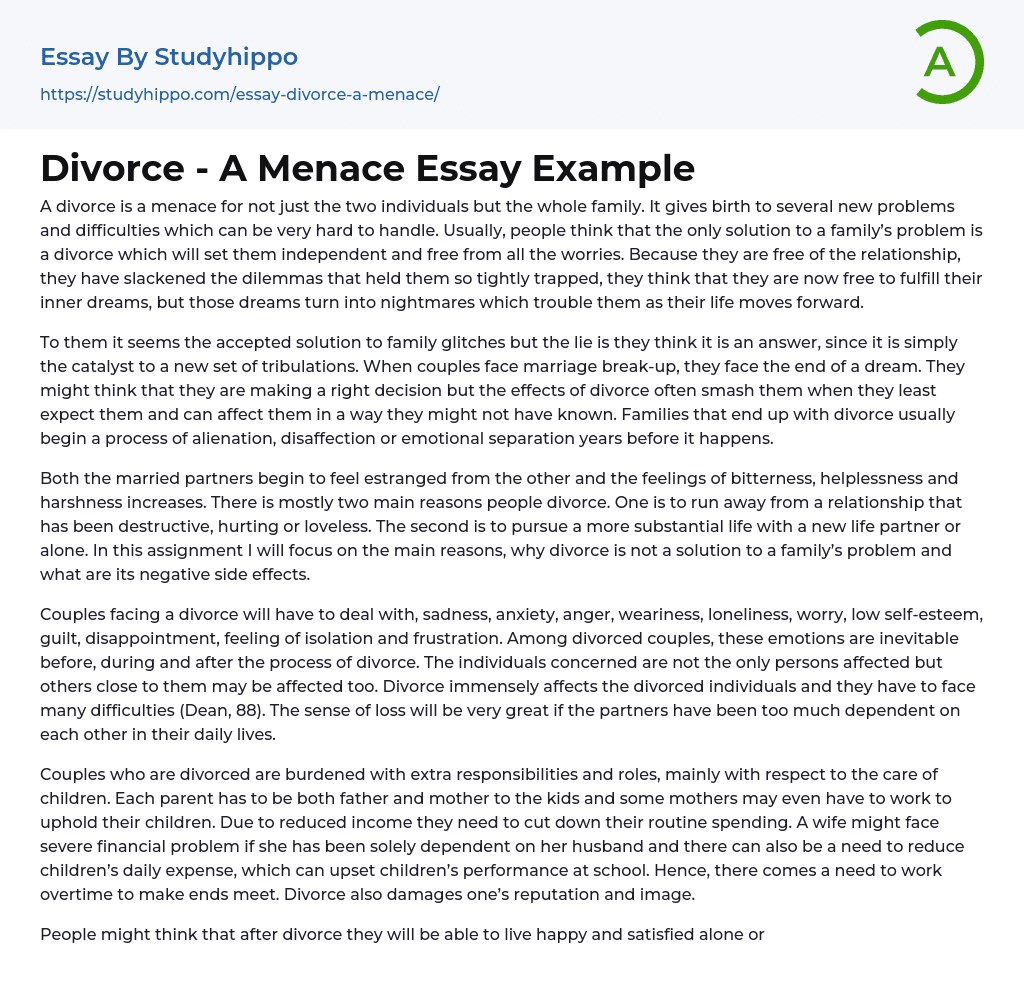Divorce affects both individuals and the entire family, bringing forth numerous challenging obstacles. While some view divorce as the only remedy for their family issues, offering them independence and alleviation from their concerns, they find that it also brings about unforeseen difficulties as they navigate through life.
While many individuals view divorce as a resolution to familial issues, they fail to acknowledge the subsequent difficulties it brings. The crumbling of a marriage signifies the termination of shared aspirations, and although couples may believe that divorcing is the correct decision, they often underestimate its unforeseen consequences and impact. Families who ultimately proceed with divorce typically experience a period of disconnection, lack of interest, or emotional distance from one another years before officially terminating their union.
Ultimately, the married
...partners begin to feel disconnected from each other, resulting in heightened emotions of bitterness, helplessness, and harshness. Divorce is usually caused by two main reasons. The first reason is the desire to leave a damaging, painful, or loveless relationship. The second reason is the aspiration for a more fulfilling life either with a new partner or on their own. This assignment aims to analyze why divorce should not be seen as a solution to family problems and explore its negative consequences.
Experiencing a divorce can lead to a range of emotions for couples, including sadness, anxiety, anger, weariness, loneliness, worry, low self-esteem, guilt, disappointment, feelings of isolation and frustration. These emotional states are inevitable throughout the entire divorce process and continue to impact divorced individuals even after it is finalized. Furthermore, not only do the individuals directly involved encounter these effects but also those
who are close to them. The consequences of divorce have significant implications and present various challenges (Dean 88). This is especially true for couples who have heavily relied on each other in their daily lives as the sense of loss can be intensified.
Divorce necessitates additional responsibilities and roles for couples, especially in terms of parenting. Both parents must assume the role of both mother and father, which may require mothers to seek employment to support their children. This decrease in income often leads to cutting back on regular expenses, causing financial challenges for wives who have been dependent on their husbands financially. Moreover, reducing daily expenses for children can adversely impact their academic performance. As a result, working overtime becomes essential to meet financial obligations. Furthermore, divorce has the potential to harm one's reputation and image.
After a divorce, individuals often believe they will find happiness and fulfillment either alone or with a new partner. However, they often overlook the fact that new relationships come with their own challenges. A new partner may assume that if someone couldn't solve problems in a previous relationship, they won't be able to handle issues in the current one either. This can lead to additional complications. The well-being of children is deeply impacted by their parents' separation as they frequently blame themselves for the divorce. It is important not to underestimate the long-term effects of divorce on children.
While some argue that parents should remain in a relationship for the sake of their children, others believe divorce is necessary. However, they overlook the potential negative consequences divorce can have on children. Divorce has the ability
to create long-lasting emotional distress and impact future generations. It can lead to feelings of insecurity and low self-esteem due to the absence of parental love and separation from siblings.
The behavior and actions of parents have a significant impact on how their child perceives the world. If parents display aggression, selfishness, intimidation, and engage in arguments, it can be traumatic for the child. When parents go through divorce or separation, it demonstrates to children that there is no safe, loving, and stable environment. Ultimately, ending a marriage poses risks and has long-term consequences for the well-being and future development of children.
The consequences of divorce on a child's life have broad implications, affecting their emotions, academic achievement, cognitive growth, conflict resolution abilities, and relationship with their parents. Divorce also presents considerable obstacles for the divorced couples themselves, resulting in intricacies in their future. In order to avoid divorce becoming the sole remedy for family issues, both partners must acquire the skills of negotiation and empathy towards each other's viewpoints. It is crucial for them to encourage cooperation and uphold transparent communication. They must openly converse about the underlying reasons behind their problems and collaborate together to tackle them.
- My Dream essays
- My Dream Job essays
- Child essays
- Child labor essays
- Childcare essays
- Adoption essays
- Aunt essays
- Babies essays
- Bedroom essays
- Caring essays
- Children essays
- Daughter essays
- Divorce essays
- Dog essays
- Dysfunctional Family essays
- Family Tradition essays
- Family Values essays
- Father essays
- Foster Care essays
- Friends essays
- Grandparent essays
- Home essays
- Hometown essays
- Husband essays
- Jealousy essays
- Love essays
- Marriage essays
- Mother essays
- Online Dating essays
- Parenting essays
- Parenting Teens essays
- Parents essays
- Relationship essays
- Room essays
- Sibling essays
- Sister essays
- Wedding essays
- Wife essays
- Adaptation essays
- Adventure essays
- Adversity essays
- Aging essays
- Alcohol essays
- Barbie Doll essays
- Beauty essays
- Care essays
- Carpe diem essays
- Change essays
- Chess essays
- Chicken essays




